Legal and Ethical Issues - Transgender Rights in Canada: Analysis
VerifiedAdded on 2020/04/13
|5
|929
|80
Essay
AI Summary
This essay examines the legal and ethical issues surrounding transgender rights in Canada, focusing on the unequal access to legal services faced by marginalized groups such as rural residents and indigenous people. It highlights the decline in public support for the Canadian justice system and its impact on individuals' health, housing, and employment. The essay discusses the importance of community-driven legal services and the hindrances faced by specific groups in accessing the legal system. It also addresses the government's failure to extend the Court Challenges Program to include funding for indigenous cases under section 35 of the Constitution, and the implications of this exclusion on Aboriginal and treaty rights. The author references articles discussing legal problems and the cost of justice in Canada, as well as the Indigenous child removal system. The essay emphasizes the need for equal access to justice and the fulfillment of constitutional rights for all citizens.
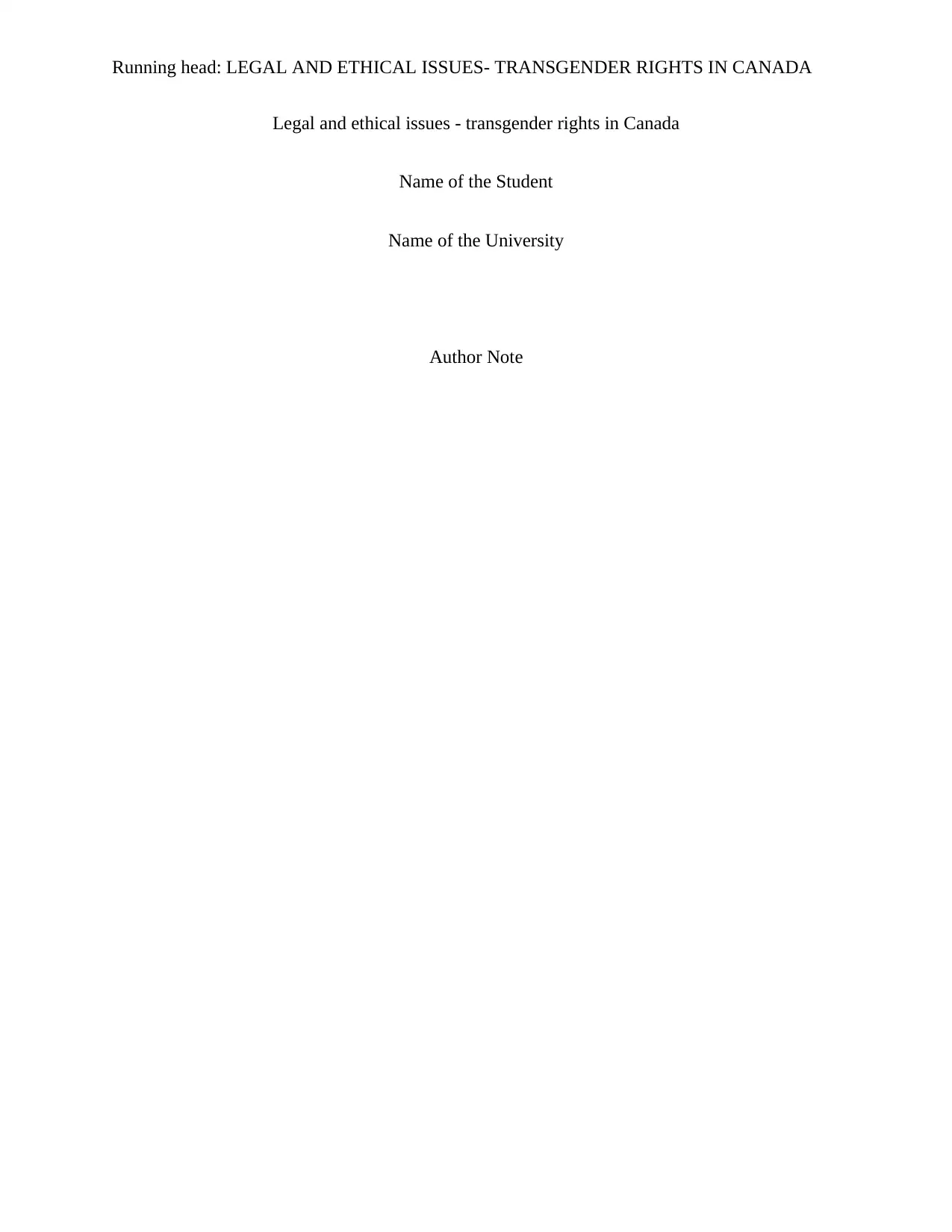
Running head: LEGAL AND ETHICAL ISSUES- TRANSGENDER RIGHTS IN CANADA
Legal and ethical issues - transgender rights in Canada
Name of the Student
Name of the University
Author Note
Legal and ethical issues - transgender rights in Canada
Name of the Student
Name of the University
Author Note
Paraphrase This Document
Need a fresh take? Get an instant paraphrase of this document with our AI Paraphraser
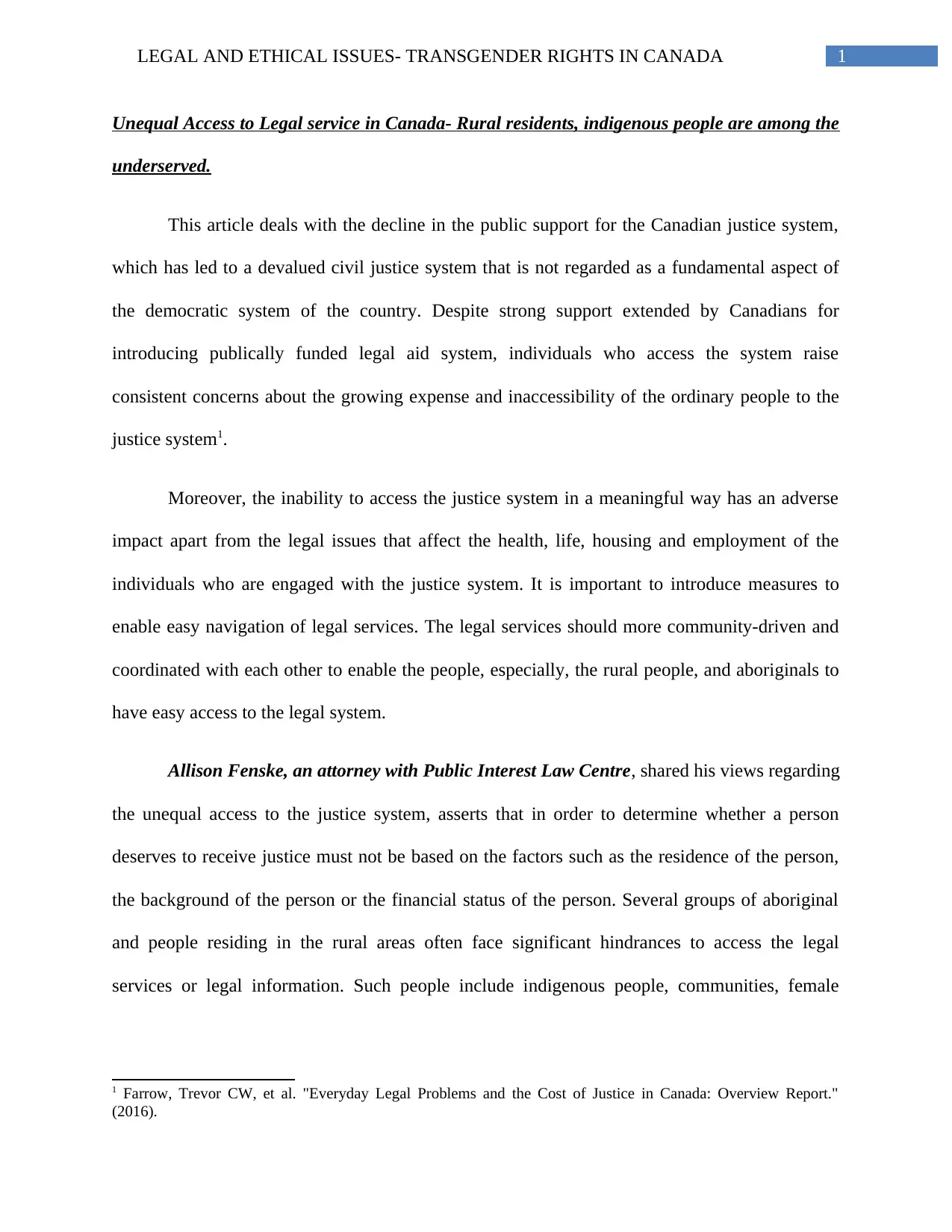
1LEGAL AND ETHICAL ISSUES- TRANSGENDER RIGHTS IN CANADA
Unequal Access to Legal service in Canada- Rural residents, indigenous people are among the
underserved.
This article deals with the decline in the public support for the Canadian justice system,
which has led to a devalued civil justice system that is not regarded as a fundamental aspect of
the democratic system of the country. Despite strong support extended by Canadians for
introducing publically funded legal aid system, individuals who access the system raise
consistent concerns about the growing expense and inaccessibility of the ordinary people to the
justice system1.
Moreover, the inability to access the justice system in a meaningful way has an adverse
impact apart from the legal issues that affect the health, life, housing and employment of the
individuals who are engaged with the justice system. It is important to introduce measures to
enable easy navigation of legal services. The legal services should more community-driven and
coordinated with each other to enable the people, especially, the rural people, and aboriginals to
have easy access to the legal system.
Allison Fenske, an attorney with Public Interest Law Centre, shared his views regarding
the unequal access to the justice system, asserts that in order to determine whether a person
deserves to receive justice must not be based on the factors such as the residence of the person,
the background of the person or the financial status of the person. Several groups of aboriginal
and people residing in the rural areas often face significant hindrances to access the legal
services or legal information. Such people include indigenous people, communities, female
1 Farrow, Trevor CW, et al. "Everyday Legal Problems and the Cost of Justice in Canada: Overview Report."
(2016).
Unequal Access to Legal service in Canada- Rural residents, indigenous people are among the
underserved.
This article deals with the decline in the public support for the Canadian justice system,
which has led to a devalued civil justice system that is not regarded as a fundamental aspect of
the democratic system of the country. Despite strong support extended by Canadians for
introducing publically funded legal aid system, individuals who access the system raise
consistent concerns about the growing expense and inaccessibility of the ordinary people to the
justice system1.
Moreover, the inability to access the justice system in a meaningful way has an adverse
impact apart from the legal issues that affect the health, life, housing and employment of the
individuals who are engaged with the justice system. It is important to introduce measures to
enable easy navigation of legal services. The legal services should more community-driven and
coordinated with each other to enable the people, especially, the rural people, and aboriginals to
have easy access to the legal system.
Allison Fenske, an attorney with Public Interest Law Centre, shared his views regarding
the unequal access to the justice system, asserts that in order to determine whether a person
deserves to receive justice must not be based on the factors such as the residence of the person,
the background of the person or the financial status of the person. Several groups of aboriginal
and people residing in the rural areas often face significant hindrances to access the legal
services or legal information. Such people include indigenous people, communities, female
1 Farrow, Trevor CW, et al. "Everyday Legal Problems and the Cost of Justice in Canada: Overview Report."
(2016).
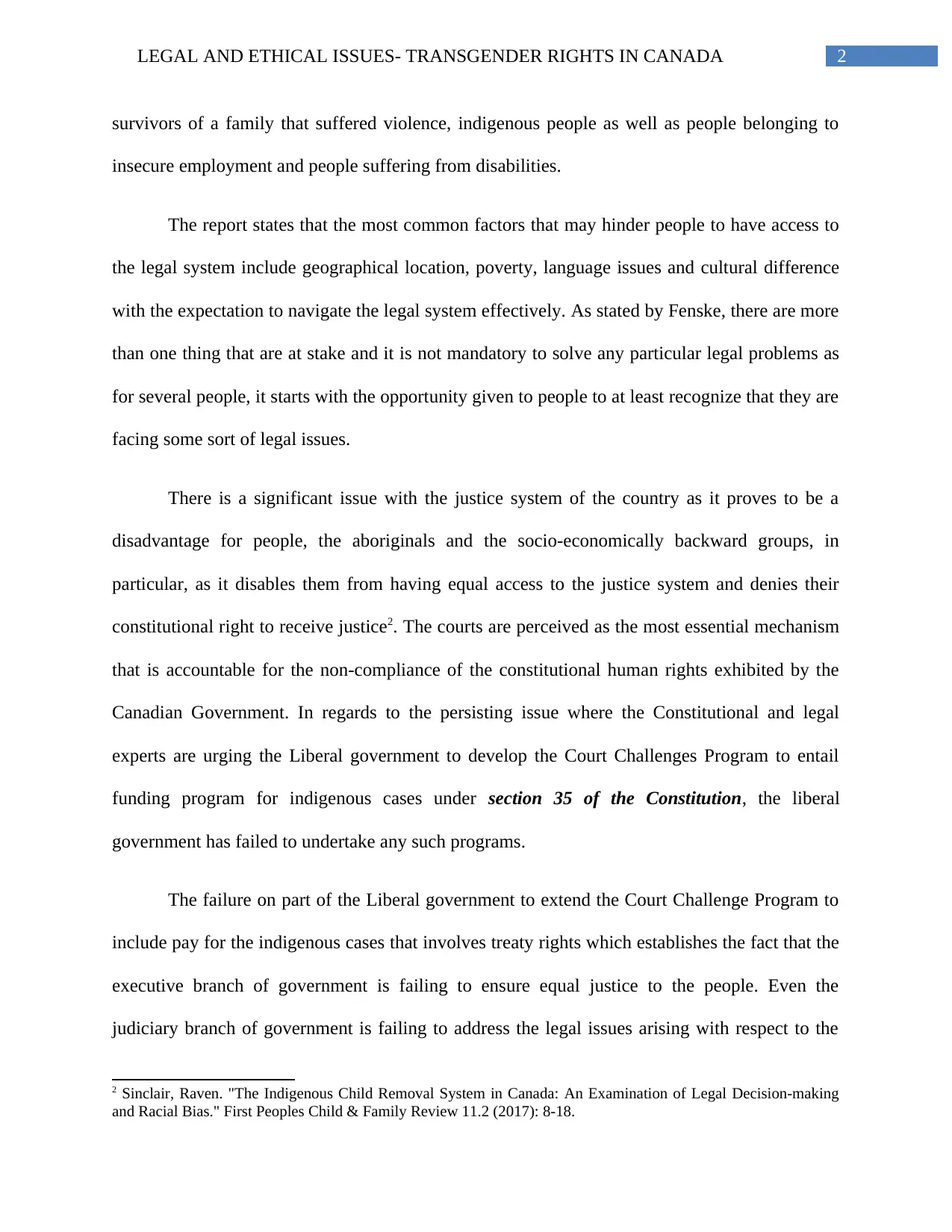
2LEGAL AND ETHICAL ISSUES- TRANSGENDER RIGHTS IN CANADA
survivors of a family that suffered violence, indigenous people as well as people belonging to
insecure employment and people suffering from disabilities.
The report states that the most common factors that may hinder people to have access to
the legal system include geographical location, poverty, language issues and cultural difference
with the expectation to navigate the legal system effectively. As stated by Fenske, there are more
than one thing that are at stake and it is not mandatory to solve any particular legal problems as
for several people, it starts with the opportunity given to people to at least recognize that they are
facing some sort of legal issues.
There is a significant issue with the justice system of the country as it proves to be a
disadvantage for people, the aboriginals and the socio-economically backward groups, in
particular, as it disables them from having equal access to the justice system and denies their
constitutional right to receive justice2. The courts are perceived as the most essential mechanism
that is accountable for the non-compliance of the constitutional human rights exhibited by the
Canadian Government. In regards to the persisting issue where the Constitutional and legal
experts are urging the Liberal government to develop the Court Challenges Program to entail
funding program for indigenous cases under section 35 of the Constitution, the liberal
government has failed to undertake any such programs.
The failure on part of the Liberal government to extend the Court Challenge Program to
include pay for the indigenous cases that involves treaty rights which establishes the fact that the
executive branch of government is failing to ensure equal justice to the people. Even the
judiciary branch of government is failing to address the legal issues arising with respect to the
2 Sinclair, Raven. "The Indigenous Child Removal System in Canada: An Examination of Legal Decision-making
and Racial Bias." First Peoples Child & Family Review 11.2 (2017): 8-18.
survivors of a family that suffered violence, indigenous people as well as people belonging to
insecure employment and people suffering from disabilities.
The report states that the most common factors that may hinder people to have access to
the legal system include geographical location, poverty, language issues and cultural difference
with the expectation to navigate the legal system effectively. As stated by Fenske, there are more
than one thing that are at stake and it is not mandatory to solve any particular legal problems as
for several people, it starts with the opportunity given to people to at least recognize that they are
facing some sort of legal issues.
There is a significant issue with the justice system of the country as it proves to be a
disadvantage for people, the aboriginals and the socio-economically backward groups, in
particular, as it disables them from having equal access to the justice system and denies their
constitutional right to receive justice2. The courts are perceived as the most essential mechanism
that is accountable for the non-compliance of the constitutional human rights exhibited by the
Canadian Government. In regards to the persisting issue where the Constitutional and legal
experts are urging the Liberal government to develop the Court Challenges Program to entail
funding program for indigenous cases under section 35 of the Constitution, the liberal
government has failed to undertake any such programs.
The failure on part of the Liberal government to extend the Court Challenge Program to
include pay for the indigenous cases that involves treaty rights which establishes the fact that the
executive branch of government is failing to ensure equal justice to the people. Even the
judiciary branch of government is failing to address the legal issues arising with respect to the
2 Sinclair, Raven. "The Indigenous Child Removal System in Canada: An Examination of Legal Decision-making
and Racial Bias." First Peoples Child & Family Review 11.2 (2017): 8-18.
⊘ This is a preview!⊘
Do you want full access?
Subscribe today to unlock all pages.

Trusted by 1+ million students worldwide
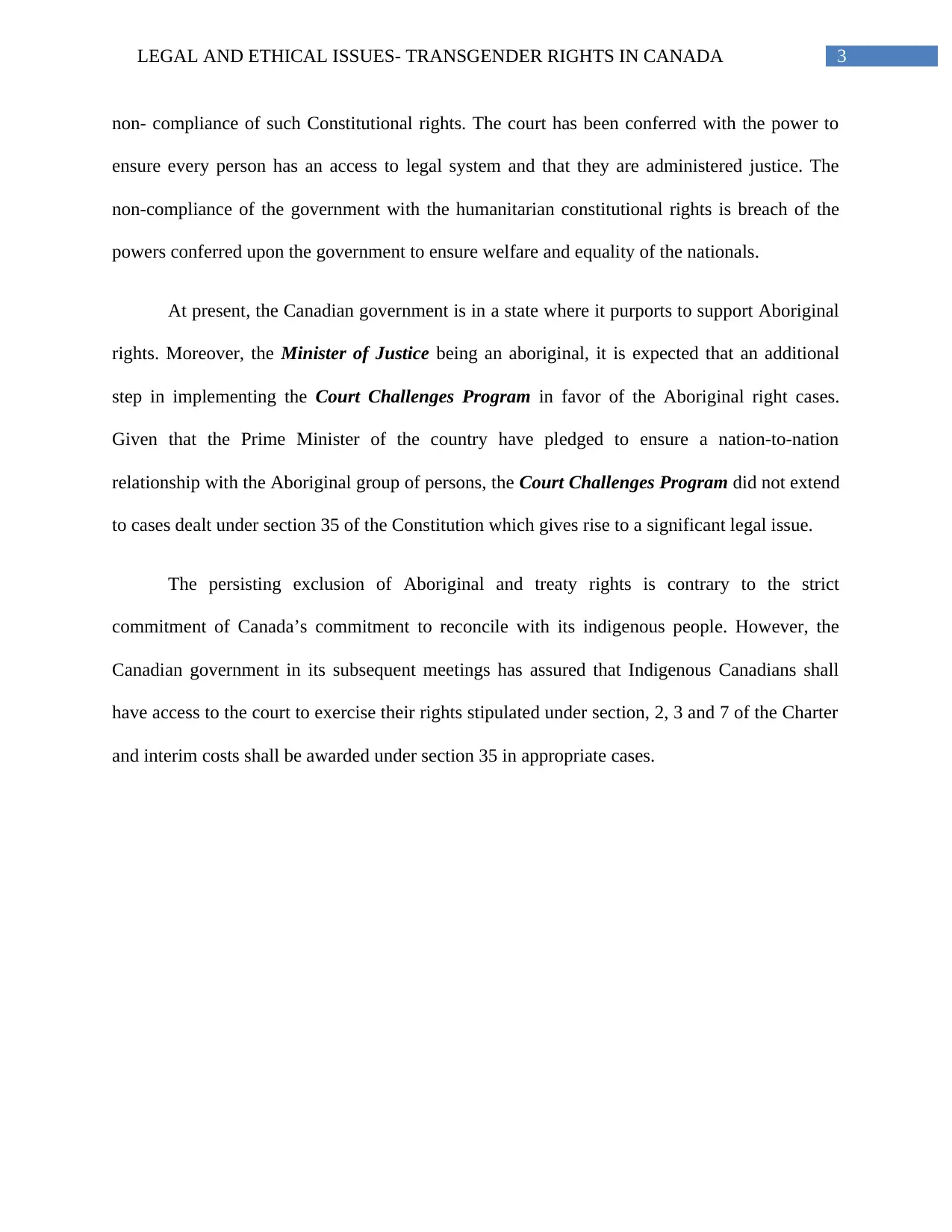
3LEGAL AND ETHICAL ISSUES- TRANSGENDER RIGHTS IN CANADA
non- compliance of such Constitutional rights. The court has been conferred with the power to
ensure every person has an access to legal system and that they are administered justice. The
non-compliance of the government with the humanitarian constitutional rights is breach of the
powers conferred upon the government to ensure welfare and equality of the nationals.
At present, the Canadian government is in a state where it purports to support Aboriginal
rights. Moreover, the Minister of Justice being an aboriginal, it is expected that an additional
step in implementing the Court Challenges Program in favor of the Aboriginal right cases.
Given that the Prime Minister of the country have pledged to ensure a nation-to-nation
relationship with the Aboriginal group of persons, the Court Challenges Program did not extend
to cases dealt under section 35 of the Constitution which gives rise to a significant legal issue.
The persisting exclusion of Aboriginal and treaty rights is contrary to the strict
commitment of Canada’s commitment to reconcile with its indigenous people. However, the
Canadian government in its subsequent meetings has assured that Indigenous Canadians shall
have access to the court to exercise their rights stipulated under section, 2, 3 and 7 of the Charter
and interim costs shall be awarded under section 35 in appropriate cases.
non- compliance of such Constitutional rights. The court has been conferred with the power to
ensure every person has an access to legal system and that they are administered justice. The
non-compliance of the government with the humanitarian constitutional rights is breach of the
powers conferred upon the government to ensure welfare and equality of the nationals.
At present, the Canadian government is in a state where it purports to support Aboriginal
rights. Moreover, the Minister of Justice being an aboriginal, it is expected that an additional
step in implementing the Court Challenges Program in favor of the Aboriginal right cases.
Given that the Prime Minister of the country have pledged to ensure a nation-to-nation
relationship with the Aboriginal group of persons, the Court Challenges Program did not extend
to cases dealt under section 35 of the Constitution which gives rise to a significant legal issue.
The persisting exclusion of Aboriginal and treaty rights is contrary to the strict
commitment of Canada’s commitment to reconcile with its indigenous people. However, the
Canadian government in its subsequent meetings has assured that Indigenous Canadians shall
have access to the court to exercise their rights stipulated under section, 2, 3 and 7 of the Charter
and interim costs shall be awarded under section 35 in appropriate cases.
Paraphrase This Document
Need a fresh take? Get an instant paraphrase of this document with our AI Paraphraser
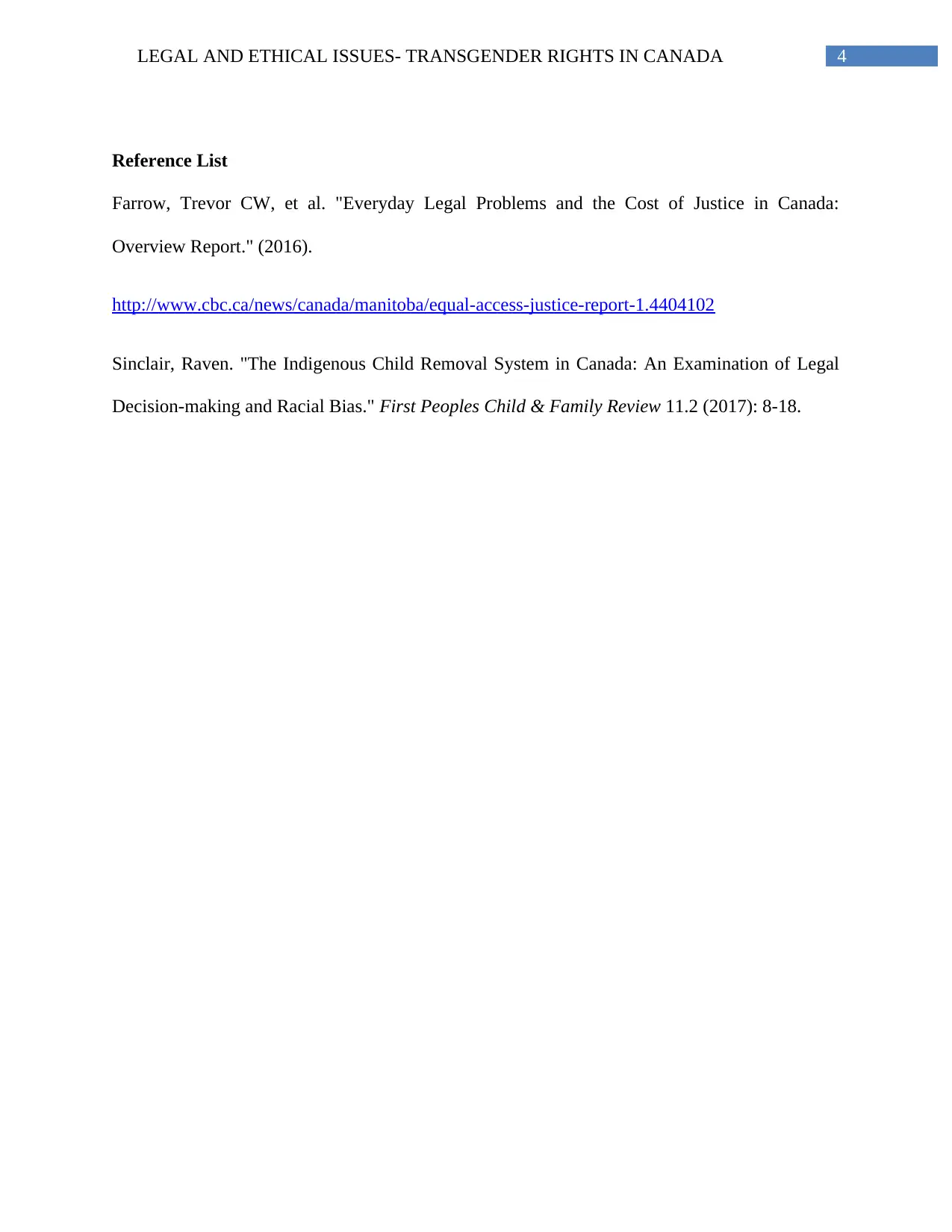
4LEGAL AND ETHICAL ISSUES- TRANSGENDER RIGHTS IN CANADA
Reference List
Farrow, Trevor CW, et al. "Everyday Legal Problems and the Cost of Justice in Canada:
Overview Report." (2016).
http://www.cbc.ca/news/canada/manitoba/equal-access-justice-report-1.4404102
Sinclair, Raven. "The Indigenous Child Removal System in Canada: An Examination of Legal
Decision-making and Racial Bias." First Peoples Child & Family Review 11.2 (2017): 8-18.
Reference List
Farrow, Trevor CW, et al. "Everyday Legal Problems and the Cost of Justice in Canada:
Overview Report." (2016).
http://www.cbc.ca/news/canada/manitoba/equal-access-justice-report-1.4404102
Sinclair, Raven. "The Indigenous Child Removal System in Canada: An Examination of Legal
Decision-making and Racial Bias." First Peoples Child & Family Review 11.2 (2017): 8-18.
1 out of 5
Related Documents
Your All-in-One AI-Powered Toolkit for Academic Success.
+13062052269
info@desklib.com
Available 24*7 on WhatsApp / Email
![[object Object]](/_next/static/media/star-bottom.7253800d.svg)
Unlock your academic potential
Copyright © 2020–2026 A2Z Services. All Rights Reserved. Developed and managed by ZUCOL.




